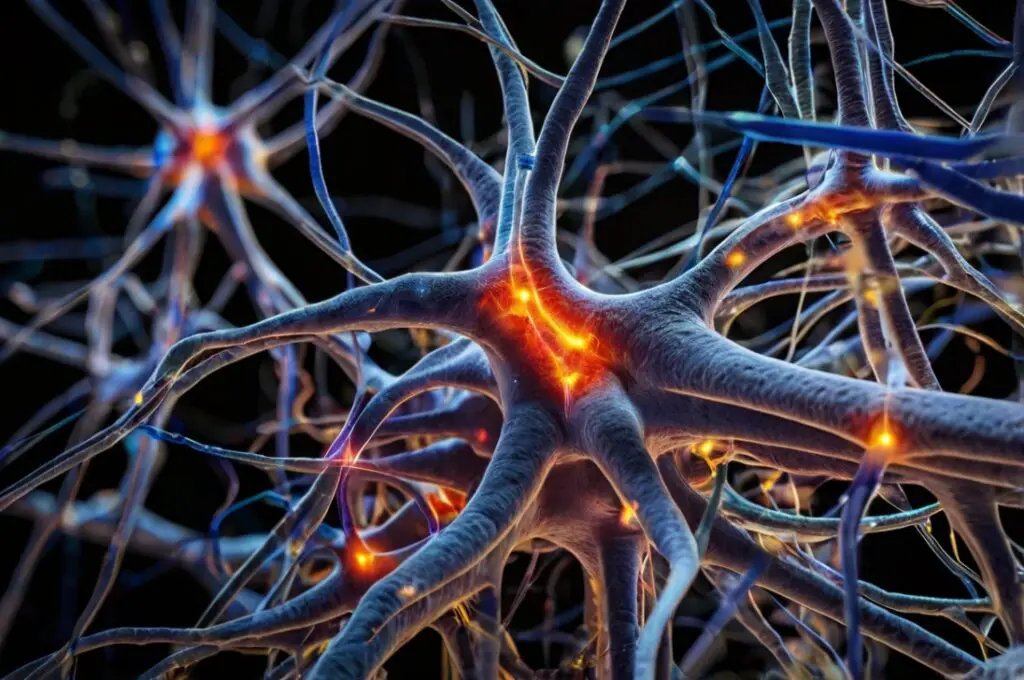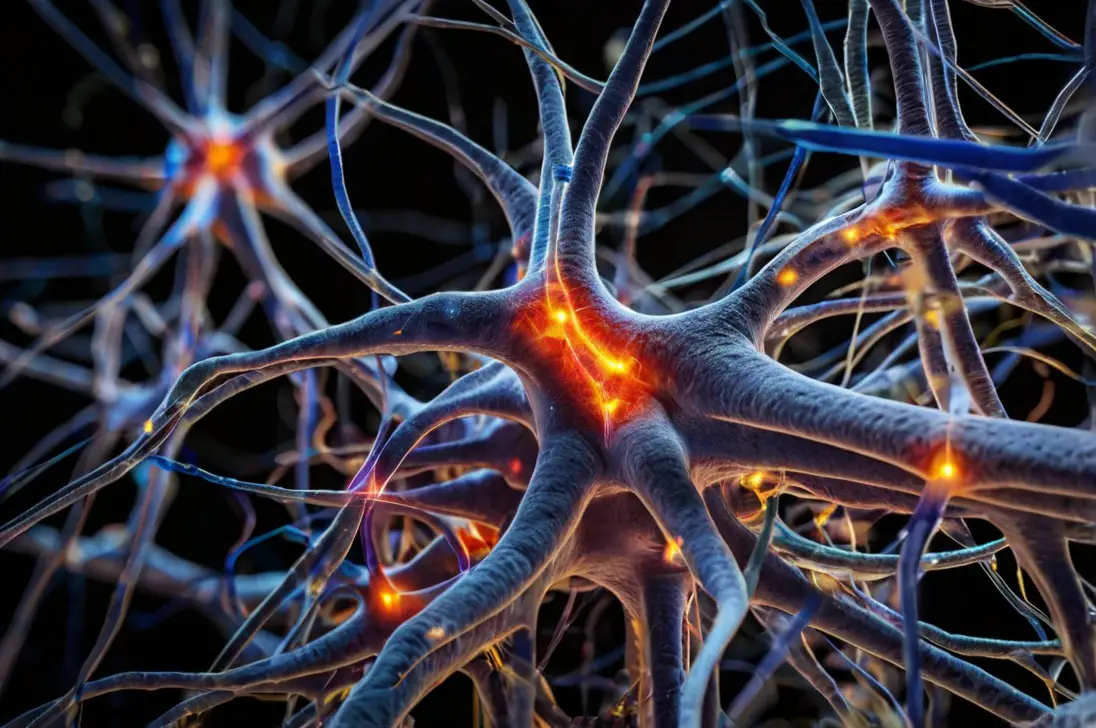
Neurotransmitters are the brain’s communication system, essential for sending messages throughout the nervous system.
Imagine them as the brain’s email system, where each message affects how we think, feel, and behave.
Without neurotransmitters, the brain’s neurons (nerve cells) wouldn’t be able to communicate, and critical functions like breathing, movement, and emotional regulation would be impossible.
Neurotransmitters’ Role in Brain Function
Neurotransmitters play a crucial role in almost every aspect of brain function.
They influence how we feel (happy, sad, anxious), how we learn and remember information, how we move our bodies, and how we sleep and eat.
When neurotransmitters are released, they cross tiny gaps between neurons called synapses and bind to receptors on the receiving neuron, transmitting their message.
Types of Neurotransmitters

There are several types of neurotransmitters, each with its own unique role in the brain.
Let’s take a closer look at some of the most important ones:
Dopamine
Dopamine is often referred to as the “feel-good” neurotransmitter.
It’s involved in reward, motivation, and pleasure.
When you achieve a goal, dopamine is released, making you feel satisfied and motivated to pursue more positive experiences.
However, dopamine also plays a role in movement and coordination, and imbalances can lead to disorders like Parkinson’s disease.
Serotonin
Serotonin is a key player in mood regulation, but it also affects sleep, appetite, and digestion.
Low levels of serotonin are linked to depression and anxiety.
Antidepressant medications like SSRIs (Selective Serotonin Reuptake Inhibitors) work by increasing serotonin levels in the brain, which can help improve mood and reduce symptoms of depression.
Norepinephrine
Norepinephrine, also known as noradrenaline, is associated with the body’s “fight or flight” response.
It helps regulate alertness, arousal, and attention.
When you’re stressed or faced with a challenging situation, norepinephrine levels increase, preparing your body to respond.
However, chronic high levels can contribute to anxiety and hypertension.
Acetylcholine
Acetylcholine is essential for learning, memory, and muscle contraction.
It helps neurons communicate in areas of the brain responsible for these functions.
Alzheimer’s disease, which is characterized by memory loss and cognitive decline, is associated with a deficiency in acetylcholine.
GABA
Gamma-Aminobutyric Acid (GABA) is the brain’s primary inhibitory neurotransmitter, meaning it helps calm the nervous system.
GABA’s role is to prevent over-excitement of the brain’s neurons, which can lead to anxiety, seizures, and other neurological issues.
Medications that enhance GABA activity are often used to treat anxiety and epilepsy.
Glutamate
Glutamate is the most abundant excitatory neurotransmitter in the brain, playing a critical role in learning and memory.
It helps strengthen synaptic connections, which is crucial for cognitive functions.
However, too much glutamate can be toxic and has been linked to neurodegenerative diseases like Alzheimer’s and ALS (Amyotrophic Lateral Sclerosis).
Endorphins
Endorphins are the body’s natural painkillers, released in response to pain or stress.
They also contribute to feelings of euphoria, often referred to as a “runner’s high.”
Endorphins help us cope with pain and stress, but imbalances can contribute to conditions like chronic pain and depression.

The Synaptic Transmission Process
The process of neurotransmission is both complex and fascinating.
Here’s how it works:
Synthesis
Neurotransmitters are the chemical messengers that neurons use to send signals.
These neurotransmitters are produced inside the neuron, typically either in the cell body or at the axon terminal, which is the end of the neuron.
Storage
Once these neurotransmitters are made, they’re stored in small sacs called vesicles.
These vesicles are like little bubbles that keep the neurotransmitters safe and ready for use.
They’re located in the axon terminal, right where the neuron is preparing to send its signal.
Release
When a neuron is ready to send a message, an electrical signal called a nerve impulse travels down the length of the neuron to the axon terminal.
This signal is like a command telling the neuron it’s time to send out the neurotransmitters.
When the nerve impulse reaches the axon terminal, it triggers the vesicles to move to the edge of the neuron and release the neurotransmitters into a tiny gap between neurons known as the synapse.
Binding
After the neurotransmitters are released into the synapse, they don’t just float around aimlessly.
They’re drawn to specific receptors on the surface of the next neuron, known as the receiving neuron.
Imagine the neurotransmitter as a key, and the receptor as a lock.
When the neurotransmitter binds to the receptor, it unlocks a response in the receiving neuron, allowing the signal to be passed along.
Inactivation
Once the neurotransmitters have done their job, they don’t stick around forever.
They need to be cleared out to prevent continuous signaling.
This happens in one of two ways: either they’re broken down by enzymes, which effectively deactivates them, or they’re reabsorbed back into the original neuron through a process called reuptake.
This clean-up process ensures that the signal stops and the system is ready for the next round of communication.
This entire process happens in a matter of milliseconds, allowing for rapid communication between neurons.

The Impact of Neurotransmitters on Brain Function
Neurotransmitters influence a wide range of brain functions, including:
Mood and emotions
Neurotransmitters like serotonin and dopamine are crucial for regulating mood and emotions.
Imbalances in these chemicals can lead to mood disorders like depression and bipolar disorder.
Learning and memory
Acetylcholine and glutamate are key to learning and memory.
They help form and strengthen synaptic connections, allowing us to retain and recall information.
Impairments in these neurotransmitters are associated with cognitive decline and memory disorders.
Movement and coordination
Dopamine plays a significant role in movement and coordination.
A deficiency in dopamine can lead to motor disorders such as Parkinson’s disease, characterized by tremors, stiffness, and difficulty moving.
Appetite and sleep
Serotonin influences both appetite and sleep.
Low levels of serotonin can lead to changes in eating habits and sleep disturbances, contributing to conditions like insomnia and eating disorders.
Pain perception
Endorphins help modulate pain perception by reducing the intensity of pain signals sent to the brain.
When endorphin levels are low, individuals may experience heightened sensitivity to pain.

Neurotransmitter Imbalances and Disorders
Imbalances in neurotransmitters can lead to various neurological and psychiatric disorders:
Depression
Depression is often linked to low levels of serotonin, dopamine, and norepinephrine.
Treatments like SSRIs aim to restore the balance of these neurotransmitters to alleviate symptoms.
Anxiety
Anxiety disorders are associated with imbalances in neurotransmitters like GABA and norepinephrine.
Medications that increase GABA activity or decrease norepinephrine levels can help manage anxiety symptoms.
Parkinson’s disease
Parkinson’s disease is caused by a significant loss of dopamine-producing neurons in the brain, leading to motor symptoms like tremors, rigidity, and bradykinesia (slowness of movement).
Alzheimer’s disease
Alzheimer’s disease is linked to a decline in acetylcholine levels, contributing to memory loss and cognitive impairment.
Current treatments focus on preserving acetylcholine levels to slow the progression of the disease.
Schizophrenia
Schizophrenia is associated with abnormal dopamine activity, particularly an excess of dopamine in certain brain regions.
This imbalance contributes to symptoms like hallucinations, delusions, and disorganized thinking.
Final Thoughts
Neurotransmitters are the unsung heroes of brain function, playing critical roles in everything from mood and memory to movement and pain perception.
Understanding how these chemical messengers work helps us better grasp the complexities of the brain and the impact of neurotransmitter imbalances on our health.
As research continues to advance, we gain more insights into how to manage and treat disorders associated with neurotransmitter dysfunction.



